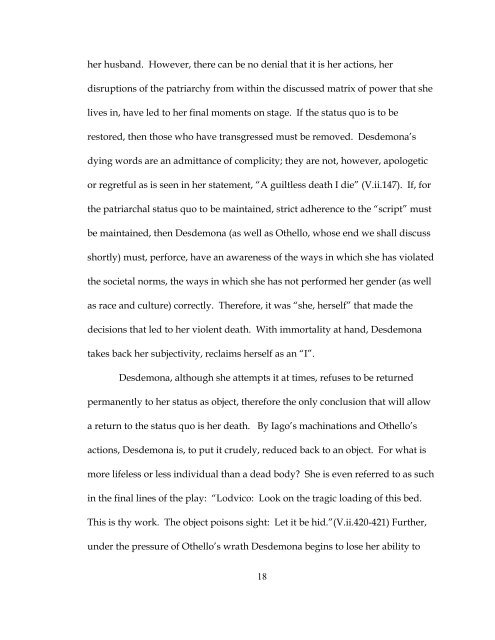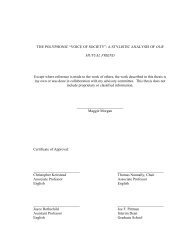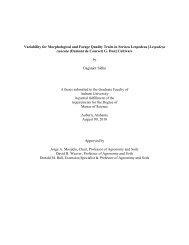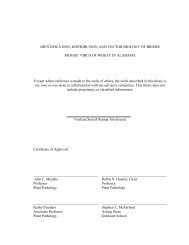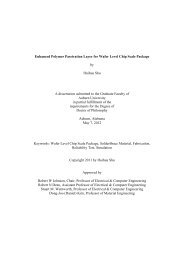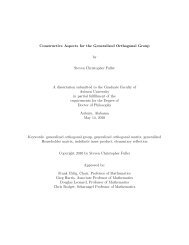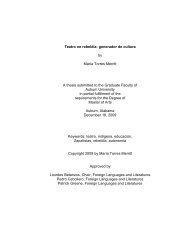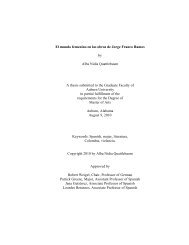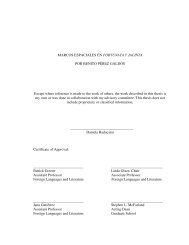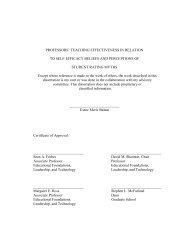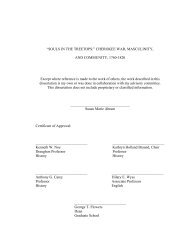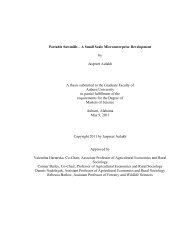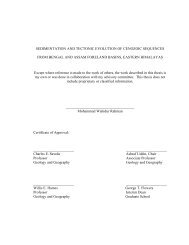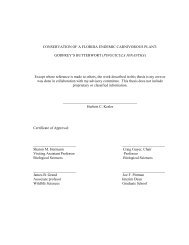the trouble with gender in othello - Auburn University Electronic ...
the trouble with gender in othello - Auburn University Electronic ...
the trouble with gender in othello - Auburn University Electronic ...
You also want an ePaper? Increase the reach of your titles
YUMPU automatically turns print PDFs into web optimized ePapers that Google loves.
her husband. However, <strong>the</strong>re can be no denial that it is her actions, her<br />
disruptions of <strong>the</strong> patriarchy from <strong>with</strong><strong>in</strong> <strong>the</strong> discussed matrix of power that she<br />
lives <strong>in</strong>, have led to her f<strong>in</strong>al moments on stage. If <strong>the</strong> status quo is to be<br />
restored, <strong>the</strong>n those who have transgressed must be removed. Desdemona’s<br />
dy<strong>in</strong>g words are an admittance of complicity; <strong>the</strong>y are not, however, apologetic<br />
or regretful as is seen <strong>in</strong> her statement, “A guiltless death I die” (V.ii.147). If, for<br />
<strong>the</strong> patriarchal status quo to be ma<strong>in</strong>ta<strong>in</strong>ed, strict adherence to <strong>the</strong> “script” must<br />
be ma<strong>in</strong>ta<strong>in</strong>ed, <strong>the</strong>n Desdemona (as well as O<strong>the</strong>llo, whose end we shall discuss<br />
shortly) must, perforce, have an awareness of <strong>the</strong> ways <strong>in</strong> which she has violated<br />
<strong>the</strong> societal norms, <strong>the</strong> ways <strong>in</strong> which she has not performed her <strong>gender</strong> (as well<br />
as race and culture) correctly. Therefore, it was “she, herself” that made <strong>the</strong><br />
decisions that led to her violent death. With immortality at hand, Desdemona<br />
takes back her subjectivity, reclaims herself as an “I”.<br />
Desdemona, although she attempts it at times, refuses to be returned<br />
permanently to her status as object, <strong>the</strong>refore <strong>the</strong> only conclusion that will allow<br />
a return to <strong>the</strong> status quo is her death. By Iago’s mach<strong>in</strong>ations and O<strong>the</strong>llo’s<br />
actions, Desdemona is, to put it crudely, reduced back to an object. For what is<br />
more lifeless or less <strong>in</strong>dividual than a dead body? She is even referred to as such<br />
<strong>in</strong> <strong>the</strong> f<strong>in</strong>al l<strong>in</strong>es of <strong>the</strong> play: “Lodvico: Look on <strong>the</strong> tragic load<strong>in</strong>g of this bed.<br />
This is thy work. The object poisons sight: Let it be hid.”(V.ii.420-421) Fur<strong>the</strong>r,<br />
under <strong>the</strong> pressure of O<strong>the</strong>llo’s wrath Desdemona beg<strong>in</strong>s to lose her ability to<br />
18


